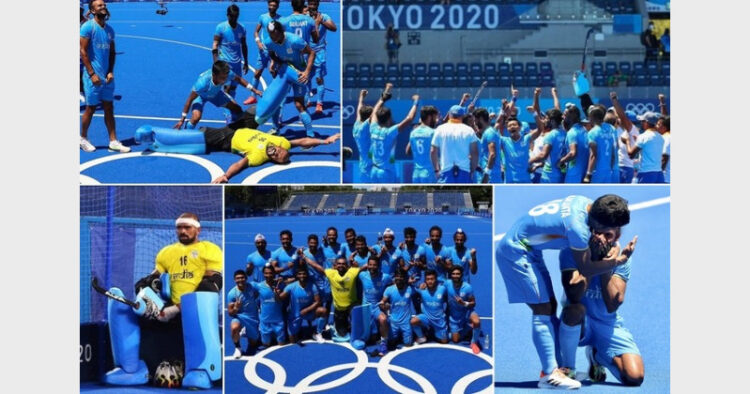Nirendra Dev
Hockey is back in the mindset of a nation that gave the world this sport!
New Delhi: Humbled and humiliated became the principal themes of stories of Indian Hockey for quite some time since the 1980 Moscow Olympics when India last picked up Gold.
Between 1928 and 1980, there have been other stories — eight Gold medals including two hat-tricks in the Olympics, one silver and two bronze.
As a reference case, it must be noted that Pakistan had finished sixth in the Atlanta Olympics, fifth in the 1998 World Cup, and won Bronze in the 1992 Olympics.
But the Indian journey since 1980 has been marred by failures, bureaucratic red-tapism of the Indian Hockey Federation itself and frustration for players.
Even in this winning team, one-star player almost gave it up and would have moved to the Netherlands to play ‘club hockey.’ Skipper Manpreet Singh had to go through poverty as his father developed mental illness. No wonder, a grounded man that he is, after the August 5th Bronze medal win, he dedicated the medal to Covid warriors.
Over the past few decades, it used to be said that one grim fact is that Indian hockey has been in the firm grip of police and Patiala.
The year 2007-08 was a real gloomy period. The IHF, under a creditable cop KPS Gill, was said to be ‘in jail’, and the team performance was shocking.
In 2007, India slumped to the lowest ever 12th in the international ranking and failed to qualify for Beijing Olympics.
An angry hockey member of the 1975 World Cup-winning team, Aslam Sher Khan, said: “Gill is behaving as a wild elephant that crushes everyone's head.”
“In 80 years, the Indian Hockey team could not qualify for the Beijing Olympics for the first time. The then Union Sports Minister Mani Shankar Aiyar had called it a “matter of shame”.”
Eight-time champions India had lost 0-2 to Britain in the final of the second Olympic qualifier in Santiago, Chile.
The illustrious Gill sahab controlled India’s hockey for so long before he was booted out in April 2008.
Hockey lovers still remember the gory episode when a TV sting operation showed IHF secretary-general K Jothikumaran accepting bribes in a cash-for-selection scandal.
After India lost in a crucial encounter with Britain at Santiago, it was clear that Gill would be given the boot as IHF chief.
Indian Olympic Association intervened, and the IHF itself was suspended.
Five hockey Olympians — chairman Aslam Sher Khan, Ashok Kumar, Ajit Pal Singh, Zafar Iqbal and Dhanraj Pillay — were asked: “To ensure proper selection of the teams for international tournaments.”
When the India Olympic Association suspended the IHF, another Gill (former CEC–Congress MP, M S Gill) was the Sports Minister, and he had backed the IOA move.
“MS Gill also said: "I believe the IHF president (Gill) must also introspect. I urge him to consider withdrawing from his current responsibility. It is time to let other Indians make an attempt to lift our hockey." ”
In 2008, Indian Olympic Association had disbanded IHF and relieved Gill from his chair. This was the second time. In the 1970s, the fate of Indian hockey was handed over to Inder Mohan Mahajan.
Many players on record and off-the-record had believed that with the exit of ‘dictator Gill’, freedom had returned, which would kickstart the transformation in the right direction.
As the saying goes–in the defeat and dark hours lay the silver lining.
The appointment of A K Bansal as the coach ensured a good rapport between him and the players, marking the right and good beginning.
But things take time and more drastic steps, and rightful encouragement.
Even in the Rio Olympics of 2016, the Indian men's team reached only the quarter-final.
"So much has been a faulty approach to sports and cricket in India that in 2016," Dilip Tirkey, a former hockey start-turned-Biju Janata Dal member from Odisha, told Rajya Sabha. He said that the selection of cricket icon Sachin Tendulkar for Bharat Ratna as the ‘first’ man from the Sports category ahead of legendary Dhyan Chand was erroneous.
His use of the phrase ‘bhed-bhav’ during a debate was a telling story.
Of course, the shift from traditional grass to synthetic turf left Indians and Pakistanis licking wounds as artistic skill works have been replaced.
But it is also a fact, if India won Gold in Moscow in Hockey in 1980, in 1983, Kapil Dev’s team lifted the Prudential World Cup. There was certainly a steady waning of interest in hockey.
The era of Sachin Tendulkars as cricket stars had set in the 1990s, and 'hockey' was almost forgotten.














Comments